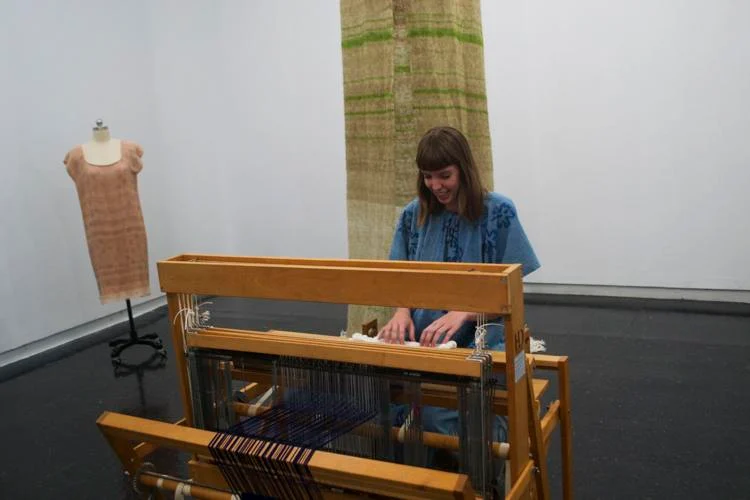


Event: Craft Making & Thinking: Appalachian Heritage & Culture Craft Conference
Date/Times: Saturday-Sunday May 24-25, 2025 10am-5pm
Location: Folk Art Center Auditorium, 382 Blue Ridge Parkway in east Asheville, NC
Admission: Free
Event Contact: Mike Hatch, 828-298-7928, [email protected]
North Carolina Humanities Press Contact: Melanie Moore Richeson, [email protected]
Southern Highland Craft Guild Presents "Craft Making & Thinking: Appalachian Heritage and Culture"
ASHEVILLE, NC [March 28, 2025] The Southern Highland Craft Guild is proud to announce its upcoming conference, "Craft Making & Thinking: Appalachian Heritage and Culture," an immersive event dedicated to celebrating the deep-rooted traditions of Appalachian craft and culture. This dynamic gathering will take place at the Folk Art Center on Saturday and Sunday, May 24-25, bringing together master craftspeople, emerging artists, storytellers, musicians, and cultural leaders to explore craft as a tool for examining Appalachian heritage and identity.
Craft Making & Thinking: Speaker Highlights
Join us May 24–25 at the Folk Art Center for two days of storytelling, music, and performance exploring the intersections of craft, culture, and community. From renowned tradition-bearers to visionary emerging artists, this year’s speaker lineup spans generations, mediums, and regions of Appalachia and beyond.
On Saturday, master artist Davy Arch opens the day with a powerful talk on the Evolution of Cherokee Arts and Crafts, tracing intergenerational knowledge and cultural resilience. Musicians Janet Wiseman and Pearl Shirley bring to life the Porch and Parlor Songs of Old Appalachia, offering both historical insight and soulful sound. Then Kelle Jolly, storyteller and singer, explores the legacy of Black Women and Appalachian Blues, connecting music, memory, and activism.
In a compelling performance piece, ceramic artist Jim McDowell portrays the enslaved potter David Drake, whose bold artistry lives on through the jars he signed and inscribed in defiance. Later that afternoon, James McKissic shares his journey in A Black Weaver’s Story, weaving personal history with diasporic tradition. Saturday also includes a short-form panel featuring three Emerging Artists moderated by Elizabeth Walton.
On Sunday, luthier and musician Brandon Johnson shares The Story of a Fiddle, detailing traditional Appalachian instrument-making techniques and their cultural resonance. Amanda McCoy, beadwork artist and director of Qualla Arts & Crafts, presents a historical and contemporary overview of America’s oldest Native cooperative. Jarrett Wildcatt, a Cherokee storyteller and singer, follows with an intimate session reflecting the ongoing vibrancy of Cherokee oral traditions and song.
Chairmaker Lyle Wheeler brings heart and humor in They Sat on Mountain Chairs, a talk on the cultural and practical legacy of handmade Appalachian chairs. And to close out the conference, artist and cultural pollinator Marie Cochran shares her work Crafting Intentional Communities, centering the voices of Affrilachian artists and building networks of equity in the craft world. Sunday also features a second Emerging Artist Panel featuring voices from the next generation of craft thinkers and makers.
Emerging Artist Spotlights
This year, we welcome a vibrant cohort of emerging artists:
-
Noelani Jones (she/they), a fiber artist raised in O‘ahu and based in the Southeast, brings a community-rooted practice informed by nature and care.
-
Sam van Strien, a Dutch-born painter and Arrowmont Artist-in-Residence, explores contemporary craft through fine art and academia.
-
Mandy Bass, a multimedia artist from Boone, NC, creates work at the edge of ecology and activism.
-
Jessica Kemper, author of The Field Guide to Embroidery, stitches North American flora and fauna into thread-based narratives.
-
Jen Otey, aka MOONbow ARTworks, fuses architectural influence and clay into a late-blooming ceramics practice full of heart.
-
Thorn Dobbs, a metals artist and dancer, blends movement and identity into multimedia work that challenges norms and celebrates fluidity.
This unforgettable weekend is a celebration of craft as a living language—rooted in heritage, shaped by story, and alive with possibility.
Mike Hatch is a glassblower, member of the Southern Highland Craft Guild, archivist for the Guild, and coordinator of this second annual event. ”For 95 years, the Southern Highland Craft Guild has served as a cornerstone of Appalachian craft," said Hatch. "Now, we are honoring the Indigenous and regional makers whose traditions form the very foundation of this heritage, ensuring their voices and techniques remain an integral part of our evolving story."
Attendees can expect:
- Thought-provoking panels on cultural heritage and the evolution of craft.
- Live demonstrations showcasing a variety of traditional and contemporary craft techniques.
- Musical performances highlighting the deep-rooted connection between craft and Appalachian sound.
- Opportunities for dialogue, networking, and hands-on learning.
The event is made possible through a grant from North Carolina Humanities, a statewide nonprofit and the state affiliate of the National Endowment for the Humanities. Join us in celebrating the rich history of Appalachian craft and honoring the artists who have shaped its legacy.
For more information, visit www.craftguild.org or contact the Folk Art Center at [email protected], 828-298-7928, or [email protected].
About the Southern Highland Craft Guild:
The Southern Highland Craft Guild was established in 1930 and is dedicated to promoting and preserving the traditional crafts of the Appalachian region. The Guild connects craft artists, collectors, and the public through exhibitions, educational programs, and outreach efforts that celebrate Appalachian culture.
About North Carolina Humanities:
North Carolina Humanities connects North Carolinians with cultural experiences that spark dialogue, deepen human connections, and inspire community. North Carolina Humanities is a statewide nonprofit and the state affiliate of the National Endowment for the Humanities. To learn more, visit www.nchumanities.org. Any views, findings, conclusions, opinions, or recommendations expressed do not necessarily represent those of North Carolina Humanities or the National Endowment for the Humanities.
















